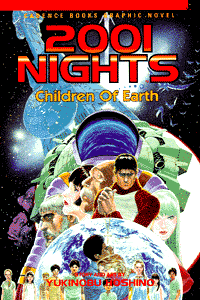
2001 Nights
An Odyssey In Inner And Outer Space
by Fred Burke
Imagine a comic about world peace, about mankind's need to find other life in the cosmos, about the love between parent and child even in the face of cold and lonely mortality. Better still, imagine a comic about colonizing the stars, about the connection between souls, about our place in the universe, about life beyond death. Yukinobu Hoshino's 2001 Nights is all of these things, and more.
Told somewhat in the fashion of The Arabian Nights, 2001 Nights gains much of its power from Hoshino's incredible ability to weave individual tales into a graceful whole. In the first Japanese volume, the stories range in length from 16 to 110 pages, each a complete and pleasing fiction on its own, each interconnecting thematically and narratively with the rest of 2001 Nights. It is a device that not only gives newcomers ample opportunity to get involved, but rewards the less-casual reader with a texture and complexity rarely seen in "serial" comics.
Although a master of the short story, Hoshino is not content to shackle himself to any one form. If a tale has a grander scope, he moves with it. A case in point is "Lucifer Rising," the seventh chapter of 2001 Nights which concludes this first Viz graphic novel. "Lucifer Rising" is about the discovery of a tenth planet in our solar system, a huge body on the far fringes, orbiting in retrograde. Hoshino names this hidden and backwards planet "Lucifer," after the "King of Demons."
When the Vatican finances a voyage to this new planet, Father Ramon Chavez must face the full mystery of Evil, a mystery ruled by a heavenly body full of malevolent power. The Pope sends him on his way with a quotation from Milton's Paradise Lost, and Chavez is left with faith and reason as his sole defense against insanity. "Lucifer Rising" combines scientific investigation, Christian mythology, Catholic theology, and a frightening new possibility for astrologers everywhere. It is also a stunningly detailed science-fiction adventure.
Although our culture is filled with benign but half-knowledgeable Western interpretations of Eastern philosophy (even I am an occasional culprit), 2001 Nights gives us the rare opportunity to see the tables turned, to take in an Eastern view of Western beliefs. It is strange and almost unsettling to see something so ingrained in our culture (in the case of "Lucifer Rising," Catholic mysticism) explored so carefully, held up to the light like an odd and fascinating gemstone. I think that perhaps now I know how a Japanese reader might react to Frank Miller's Ronin.
It is important not to accept these mythological trappings as spiritual belief, however. Hoshino precedes his forays into demonology with a clear and poignant vision of the afterlife, of astral bodies soaring free through the vast void of space. Such optimistic notes in the early stories (the coming of world peace, the discovery of life on other worlds, the planting of human seeds on distant soil) are like armor, protecting the reader from the grittier stuff of Western myth and theology.
Hoshino has more modern Western influences than Milton. 2001 Nights, subtitled "A Space Fantasy" in Japan, pays obvious graphic homage to director Stanley Kubrick's 2001: A Space Odyssey. In framing his space sequences, Hoshino sticks with the classic, and it gives 2001 Nights a grandeur of form, a slow majesty of pacing, rare in comics. Just as 2001 Nights combines Western and Eastern thought, short story and epic, it also mixes American and Japanese storytelling styles. Yukinobu neither shies away from in-depth exposition and dialogue nor feels compelled to break the silence of a sequence with words for the sake of words. It is a combination that works.
Hoshino also gives his pages a crisp clarity that makes 2001 Nights a visual joy, rendering every figure, every spaceship, as if it were a perfectly composes black and white photograph. With skillful use of gray screens and a mastery of delicate cross-hatching, Yukinobu shows his talent as an artist in the classical mode.
But it is to the basic themes of writer Arthur C. Clarke's 2001: A Space Odyssey, inextricably linking spirituality with space exploration, that 2001 Nights owes its greatest debt. Hoshino proudly raises the banner of 1960s science fiction, proclaiming unequivocably that any journey to worlds outside our own will be met with accompanying revelations about the very nature of humankind.
We can but hope.
fburke@netjaunt.com